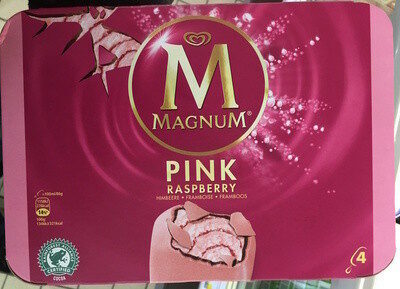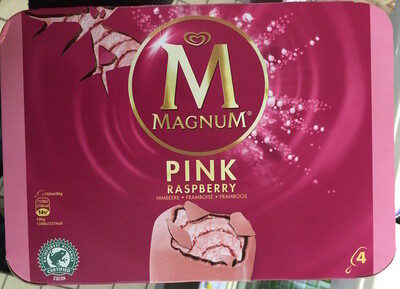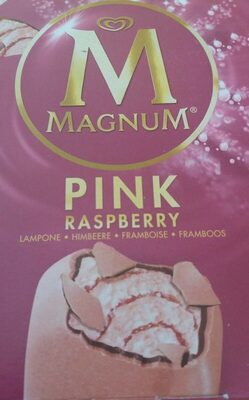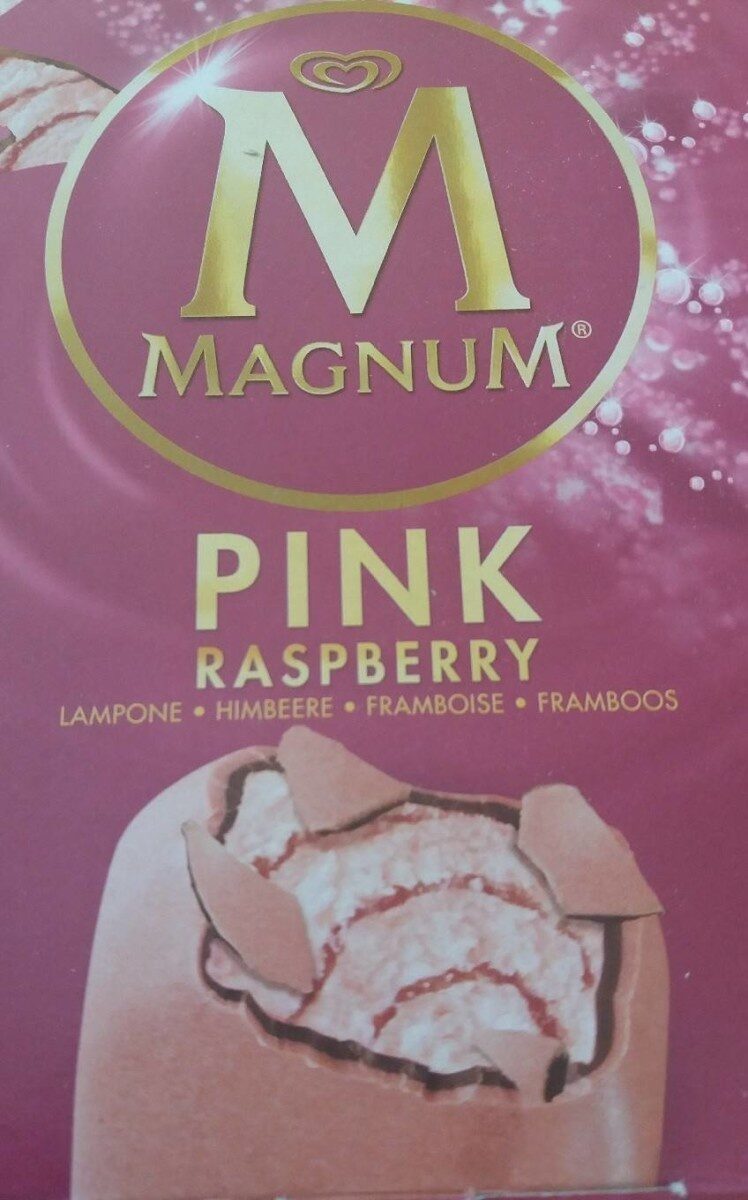Help us make food transparency the norm!
As a non-profit organization, we depend on your donations to continue informing consumers around the world about what they eat.
The food revolution starts with you!
Pink Raspberry - Magnum - 4 * 100 ml (400 ml) (344 g)
Pink Raspberry - Magnum - 4 * 100 ml (400 ml) (344 g)
This product page is not complete. You can help to complete it by editing it and adding more data from the photos we have, or by taking more photos using the app for Android or iPhone/iPad. Thank you!
×
Barcode: 8712100685392 (EAN / EAN-13)
Common name: Glace à la framboise avec une sauce à la framboise (6%), enrobée de chocolat au lait (24%) et d'une couverture rose (5%)
Quantity: 4 * 100 ml (400 ml) (344 g)
Packaging: Plastic, Bag, Cardboard, Frozen
Brands: Magnum
Categories: Desserts, Frozen foods, Frozen desserts, Ice creams and sorbets, Ice creams
Labels, certifications, awards:
No gluten, Made in the EU, Rainforest Alliance
Stores: Intermarché, Magasins U
Countries where sold: France, Switzerland
Matching with your preferences
Health
Ingredients
-
27 ingredients
: Lait écrémé réhydraté, sucre, purée de framboise (10%), huile de coco, beurre de cacao, pâte de cacao, sirop de glucose, sirop de glucose-fructose, lait en poudre entier, beurre concentré, lait en poudre écrémé ou concentré, colorants (E171, E172), émulsifiants (mono - et diglycérides d'acides gras, lécithine de soja, polyricinoléate de polyglycérol), lactose et protéines de lait, stabilisants (gomme guar, farine de graines de caroube, carraghénanes), jus de betterave concentré, acidifiant (acide citrique), arômes.Allergens: Milk, SoybeansTraces: Nuts, Sesame seeds
Food processing
-
Ultra processed foods
Elements that indicate the product is in the 4 - Ultra processed food and drink products group:
- Additive: E171 - Titanium dioxide
- Additive: E172 - Iron oxides and iron hydroxides
- Additive: E322 - Lecithins
- Additive: E407 - Carrageenan
- Additive: E412 - Guar gum
- Additive: E471 - Mono- and diglycerides of fatty acids
- Additive: E476 - Polyglycerol polyricinoleate
- Ingredient: Colour
- Ingredient: Emulsifier
- Ingredient: Flavouring
- Ingredient: Glucose
- Ingredient: Glucose syrup
- Ingredient: Lactose
- Ingredient: Milk proteins
Food products are classified into 4 groups according to their degree of processing:
- Unprocessed or minimally processed foods
- Processed culinary ingredients
- Processed foods
- Ultra processed foods
The determination of the group is based on the category of the product and on the ingredients it contains.
Additives
-
E171 - Titanium dioxide
Titanium dioxide: Titanium dioxide, also known as titaniumIV oxide or titania, is the naturally occurring oxide of titanium, chemical formula TiO2. When used as a pigment, it is called titanium white, Pigment White 6 -PW6-, or CI 77891. Generally, it is sourced from ilmenite, rutile and anatase. It has a wide range of applications, including paint, sunscreen and food coloring. When used as a food coloring, it has E number E171. World production in 2014 exceeded 9 million metric tons. It has been estimated that titanium dioxide is used in two-thirds of all pigments, and the oxide has been valued at $13.2 billion.Source: Wikipedia
-
E322 - Lecithins
Lecithins are natural compounds commonly used in the food industry as emulsifiers and stabilizers.
Extracted from sources like soybeans and eggs, lecithins consist of phospholipids that enhance the mixing of oil and water, ensuring smooth textures in various products like chocolates, dressings, and baked goods.
They do not present any known health risks.
-
E322i - Lecithin
Lecithins are natural compounds commonly used in the food industry as emulsifiers and stabilizers.
Extracted from sources like soybeans and eggs, lecithins consist of phospholipids that enhance the mixing of oil and water, ensuring smooth textures in various products like chocolates, dressings, and baked goods.
They do not present any known health risks.
-
E330 - Citric acid
Citric acid is a natural organic acid found in citrus fruits such as lemons, oranges, and limes.
It is widely used in the food industry as a flavor enhancer, acidulant, and preservative due to its tart and refreshing taste.
Citric acid is safe for consumption when used in moderation and is considered a generally recognized as safe (GRAS) food additive by regulatory agencies worldwide.
-
E407 - Carrageenan
Carrageenan (E407), derived from red seaweed, is widely employed in the food industry as a gelling, thickening, and stabilizing agent, notably in dairy and meat products.
It can exist in various forms, each imparting distinct textural properties to food.
However, its degraded form, often referred to as poligeenan, has raised health concerns due to its potential inflammatory effects and its classification as a possible human carcinogen (Group 2B) by the International Agency for Research on Cancer (IARC).
Nevertheless, food-grade carrageenan has been deemed safe by various regulatory bodies when consumed in amounts typically found in food.
-
E412 - Guar gum
Guar gum (E412) is a natural food additive derived from guar beans.
This white, odorless powder is valued for its remarkable thickening and stabilizing properties, making it a common ingredient in various food products, including sauces, dressings, and ice creams.
When used in moderation, guar gum is considered safe for consumption, with no known adverse health effects.
-
E471 - Mono- and diglycerides of fatty acids
Mono- and diglycerides of fatty acids (E471), are food additives commonly used as emulsifiers in various processed foods.
These compounds consist of glycerol molecules linked to one or two fatty acid chains, which help stabilize and blend water and oil-based ingredients. E471 enhances the texture and shelf life of products like margarine, baked goods, and ice cream, ensuring a smooth and consistent texture.
It is generally considered safe for consumption within established regulatory limits.
-
E476 - Polyglycerol polyricinoleate
Polyglycerol polyricinoleate: Polyglycerol polyricinoleate -PGPR-, E476, is an emulsifier made from glycerol and fatty acids -usually from castor bean, but also from soybean oil-. In chocolate, compound chocolate and similar coatings, PGPR is mainly used with another substance like lecithin to reduce viscosity. It is used at low levels -below 0.5%-, and works by decreasing the friction between the solid particles -e.g. cacao, sugar, milk- in molten chocolate, reducing the yield stress so that it flows more easily, approaching the behaviour of a Newtonian fluid. It can also be used as an emulsifier in spreads and in salad dressings, or to improve the texture of baked goods. It is made up of a short chain of glycerol molecules connected by ether bonds, with ricinoleic acid side chains connected by ester bonds. PGPR is a yellowish, viscous liquid, and is strongly lipophilic: it is soluble in fats and oils and insoluble in water and ethanol.Source: Wikipedia
Ingredients analysis
-
May contain palm oil
Ingredients that may contain palm oil: Butterfat, E471
-
Non-vegan
Non-vegan ingredients: Reconstituted skimmed milk, Whole milk powder, Butterfat, Skimmed milk powder, Lactose and milk proteins
-
Maybe vegetarian
Ingredients that may not be vegetarian: Raspberry puree, E471, Flavouring
-
Details of the analysis of the ingredients
: _Lait_ écrémé réhydraté, sucre, purée de framboise 10%, huile de coco, beurre de cacao, pâte de cacao, sirop de glucose, sirop de glucose-fructose, _lait_ en poudre entier, _beurre_ concentré, _lait_ en poudre écrémé, colorants (e171, e172), émulsifiants (mono- et diglycérides d'acides gras, lécithine de _soja_, polyricinoléate de polyglycérol), _lactose_ et protéines de _lait_, stabilisants (gomme guar, farine de graines de caroube, carraghénanes), jus de betterave concentré, acidifiant (acide citrique), arômes- _Lait_ écrémé réhydraté -> en:reconstituted-skimmed-milk - vegan: no - vegetarian: yes - ciqual_proxy_food_code: 19051 - percent_min: 10 - percent_max: 80
- sucre -> en:sugar - vegan: yes - vegetarian: yes - ciqual_proxy_food_code: 31016 - percent_min: 10 - percent_max: 24
- purée de framboise -> en:raspberry-puree - vegan: maybe - vegetarian: maybe - ciqual_food_code: 13015 - percent_min: 10 - percent: 10 - percent_max: 10
- huile de coco -> en:coconut-oil - vegan: yes - vegetarian: yes - from_palm_oil: no - ciqual_food_code: 16040 - percent_min: 0 - percent_max: 10
- beurre de cacao -> en:cocoa-butter - vegan: yes - vegetarian: yes - ciqual_food_code: 16030 - percent_min: 0 - percent_max: 10
- pâte de cacao -> en:cocoa-paste - vegan: yes - vegetarian: yes - ciqual_proxy_food_code: 16030 - percent_min: 0 - percent_max: 10
- sirop de glucose -> en:glucose-syrup - vegan: yes - vegetarian: yes - ciqual_proxy_food_code: 31016 - percent_min: 0 - percent_max: 10
- sirop de glucose-fructose -> en:glucose-fructose-syrup - vegan: yes - vegetarian: yes - ciqual_food_code: 31077 - percent_min: 0 - percent_max: 10
- _lait_ en poudre entier -> en:whole-milk-powder - vegan: no - vegetarian: yes - ciqual_food_code: 19021 - percent_min: 0 - percent_max: 10
- _beurre_ concentré -> en:butterfat - vegan: no - vegetarian: yes - from_palm_oil: maybe - ciqual_food_code: 16401 - percent_min: 0 - percent_max: 10
- _lait_ en poudre écrémé -> en:skimmed-milk-powder - vegan: no - vegetarian: yes - ciqual_food_code: 19054 - percent_min: 0 - percent_max: 8.88888888888889
- colorants -> en:colour - percent_min: 0 - percent_max: 8
- e171 -> en:e171 - vegan: yes - vegetarian: yes - percent_min: 0 - percent_max: 8
- e172 -> en:e172 - vegan: yes - vegetarian: yes - percent_min: 0 - percent_max: 4
- émulsifiants -> en:emulsifier - percent_min: 0 - percent_max: 7.27272727272727
- mono- et diglycérides d'acides gras -> en:e471 - vegan: maybe - vegetarian: maybe - from_palm_oil: maybe - percent_min: 0 - percent_max: 7.27272727272727
- lécithine de _soja_ -> en:soya-lecithin - vegan: yes - vegetarian: yes - ciqual_food_code: 42200 - percent_min: 0 - percent_max: 3.63636363636364
- polyricinoléate de polyglycérol -> en:e476 - vegan: yes - vegetarian: yes - percent_min: 0 - percent_max: 2.42424242424242
- _lactose_ et protéines de _lait_ -> en:lactose-and-milk-proteins - vegan: no - vegetarian: yes - percent_min: 0 - percent_max: 6.66666666666667
- stabilisants -> en:stabiliser - percent_min: 0 - percent_max: 6.15384615384615
- gomme guar -> en:e412 - vegan: yes - vegetarian: yes - percent_min: 0 - percent_max: 6.15384615384615
- farine de graines de caroube -> en:carob-seed-flour - vegan: yes - vegetarian: yes - ciqual_proxy_food_code: 9410 - percent_min: 0 - percent_max: 3.07692307692308
- carraghénanes -> en:e407 - vegan: yes - vegetarian: yes - percent_min: 0 - percent_max: 2.05128205128205
- jus de betterave concentré -> en:beetroot-juice-concentrate - vegan: yes - vegetarian: yes - ciqual_proxy_food_code: 20091 - percent_min: 0 - percent_max: 5.71428571428571
- acidifiant -> en:acid - percent_min: 0 - percent_max: 5.33333333333333
- acide citrique -> en:e330 - vegan: yes - vegetarian: yes - percent_min: 0 - percent_max: 5.33333333333333
- arômes -> en:flavouring - vegan: maybe - vegetarian: maybe - percent_min: 0 - percent_max: 5
Nutrition
-
Bad nutritional quality
⚠ ️Warning: the amount of fruits, vegetables and nuts is not specified on the label, it was estimated from the list of ingredients: 10This product is not considered a beverage for the calculation of the Nutri-Score.
Positive points: 0
- Proteins: 1 / 5 (value: 2.5, rounded value: 2.5)
- Fiber: 0 / 5 (value: 0, rounded value: 0)
- Fruits, vegetables, nuts, and colza/walnut/olive oils: 0 / 5 (value: 10.015625, rounded value: 10)
Negative points: 19
- Energy: 4 / 10 (value: 1346, rounded value: 1346)
- Sugars: 5 / 10 (value: 24, rounded value: 24)
- Saturated fat: 10 / 10 (value: 14, rounded value: 14)
- Sodium: 0 / 10 (value: 40, rounded value: 40)
The points for proteins are not counted because the negative points are greater or equal to 11.
Nutritional score: (19 - 0)
Nutri-Score:
-
Nutrient levels
-
Fat in moderate quantity (18%)
What you need to know- A high consumption of fat, especially saturated fats, can raise cholesterol, which increases the risk of heart diseases.
Recommendation: Limit the consumption of fat and saturated fat- Choose products with lower fat and saturated fat content.
-
Saturated fat in high quantity (14%)
What you need to know- A high consumption of fat, especially saturated fats, can raise cholesterol, which increases the risk of heart diseases.
Recommendation: Limit the consumption of fat and saturated fat- Choose products with lower fat and saturated fat content.
-
Sugars in high quantity (24%)
What you need to know- A high consumption of sugar can cause weight gain and tooth decay. It also augments the risk of type 2 diabetes and cardio-vascular diseases.
Recommendation: Limit the consumption of sugar and sugary drinks- Sugary drinks (such as sodas, fruit beverages, and fruit juices and nectars) should be limited as much as possible (no more than 1 glass a day).
- Choose products with lower sugar content and reduce the consumption of products with added sugars.
-
Salt in low quantity (0.1%)
What you need to know- A high consumption of salt (or sodium) can cause raised blood pressure, which can increase the risk of heart disease and stroke.
- Many people who have high blood pressure do not know it, as there are often no symptoms.
- Most people consume too much salt (on average 9 to 12 grams per day), around twice the recommended maximum level of intake.
Recommendation: Limit the consumption of salt and salted food- Reduce the quantity of salt used when cooking, and don't salt again at the table.
- Limit the consumption of salty snacks and choose products with lower salt content.
-
-
Nutrition facts
Nutrition facts As sold
for 100 g / 100 mlAs sold
per serving (100 ml)Compared to: Ice creams Energy 1,346 kj
(276 kcal)1,350 kj
(276 kcal)+39% Fat 18 g 18 g +57% Saturated fat 14 g 14 g +86% Carbohydrates 26 g 26 g -7% Sugars 24 g 24 g +6% Fiber 0 g 0 g -100% Proteins 2.5 g 2.5 g -24% Salt 0.1 g 0.1 g -40% Fruits‚ vegetables‚ nuts and rapeseed‚ walnut and olive oils (estimate from ingredients list analysis) 10.016 % 10.016 %
Environment
-
Eco-Score B - Low environmental impact
⚠ ️Select a country in order to include the full impact of transportation.The Eco-Score is an experimental score that summarizes the environmental impacts of food products.→ The Eco-Score was initially developped for France and it is being extended to other European countries. The Eco-Score formula is subject to change as it is regularly improved to make it more precise and better suited to each country.Life cycle analysis
-
Average impact of products of the same category: A (Score: 87/100)
Category: Ice cream, cone (normal size)
Category: Ice cream, cone (normal size)
- PEF environmental score: 0.22 (the lower the score, the lower the impact)
- including impact on climate change: 1.75 kg CO2 eq/kg of product
Stage Impact Agriculture
56.9 %Processing
18.1 %Packaging
6.7 %Transportation
6.9 %Distribution
7.2 %Consumption
4.2 %
Bonuses and maluses
-
Missing origins of ingredients information
Malus: -5
⚠ ️ The origins of the ingredients of this product are not indicated.
If they are indicated on the packaging, you can modify the product sheet and add them.
If you are the manufacturer of this product, you can send us the information with our free platform for producers.
-
Packaging with a medium impact
Malus: -11
Shape Material Recycling Impact Bag Plastic High Unknown Cardboard Low ⚠ ️ The information about the packaging of this product is not sufficiently precise (exact shapes and materials of all components of the packaging).⚠ ️ For a more precise calculation of the Eco-Score, you can modify the product page and add them.
If you are the manufacturer of this product, you can send us the information with our free platform for producers.
Eco-Score for this product
-
Impact for this product: B (Score: 79/100)
Product: Pink Raspberry - Magnum - 4 * 100 ml (400 ml) (344 g)
Life cycle analysis score: 87
Sum of bonuses and maluses: -6
Final score: 79/100 (The score of products with non-recyclable and non-biodegradable packaging materials is capped at 79 (grade B).)
-
Carbon footprint
-
Equal to driving 0.9 km in a petrol car
175 g CO² per 100g of product
The carbon emission figure comes from ADEME's Agribalyse database, for the category: Ice cream, cone (normal size) (Source: ADEME Agribalyse Database)
Stage Impact Agriculture
61.0 %Processing
12.3 %Packaging
10.3 %Transportation
11.3 %Distribution
3.7 %Consumption
1.4 %
Packaging
-
Packaging with a medium impact
-
Packaging parts
Bag (Plastic)
(Cardboard)
-
Packaging materials
Material % Packaging weight Packaging weight per 100 g of product Paper or cardboard Plastic Total
-
Transportation
-
Origins of ingredients
Missing origins of ingredients information
⚠ ️ The origins of the ingredients of this product are not indicated.
If they are indicated on the packaging, you can modify the product sheet and add them.
If you are the manufacturer of this product, you can send us the information with our free platform for producers.Add the origins of ingredients for this product Add the origins of ingredients for this product
Labels
Report a problem
-
Incomplete or incorrect information?
Category, labels, ingredients, allergens, nutritional information, photos etc.
If the information does not match the information on the packaging, please complete or correct it. Open Food Facts is a collaborative database, and every contribution is useful for all.
Data sources
Product added on by tacite
Last edit of product page on by roboto-app.
Product page also edited by aleene, ecoscore-impact-estimator, foodrepo, kiliweb, magasins-u, openfood-ch-import, openfoodfacts-contributors, packbot, yuka.UmZ3Zk4vNWJoK3N3b2ZJaDdralczdE56NE02UFdYenVjZFlCSWc9PQ, yuka.VFA0cUFMeFFpc2tXbXNVUDFEVDBwSXBjeHJTQVFYT2JNZW85SVE9PQ, yuka.Wjd3Skw2TUY5dFZTaXZZLzNUUG5xdWhSbTdHb1UzcVZDTHM3SUE9PQ, yuka.sY2b0xO6T85zoF3NwEKvlkkdY9D9uzXoLiHut320yo2tCpHaY9pP5LGmaqs, yukafix.












